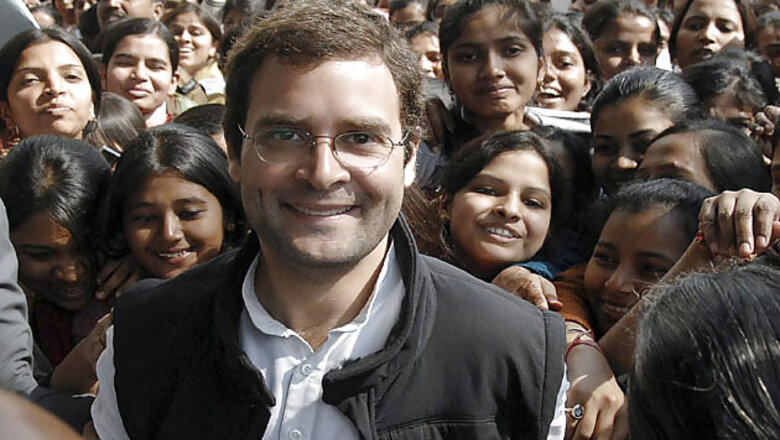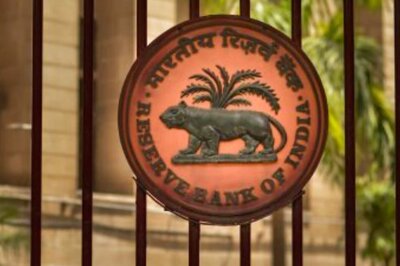
views
New Delhi: The illness of Sonia Gandhi, India's most powerful political leader, may have set off a risky succession that could propel her inexperienced son Rahul to government just as the Congress party battles corruption scandals and high inflation.
The appointment of the 41-year-old Rahul to a quartet that will administer political affairs for Congress as she is being treated for an illness abroad came as a surprise to many, because other more senior and experienced leaders were ignored.
Sonia Gandhi's illness was not disclosed in Thursday's surprise announcement, but the 64-year-old party chief may be away for weeks. Her absence may be longer if two newspaper reports, which said she had cancer, are correct.
The Congress party said on Friday she had undergone successful surgery, but Rahul's appointment may signal her intention for eventual succession even if she quickly returns to office.
"He's being entrusted with a very important responsibility to keep the wheel turning. It's an expansion of his purview," said political analyst Mahesh Rangarajan. "One day he will be prime minister, but this is basically continuity. It's a signal of continuity to the party."
Stung by opposition criticism that India could not be run by an Italian-born leader, Sonia Gandhi nominated Manmohan Singh as Prime Minister after her 2004 election win. Since then she has largely run the country from behind the scenes, winning re-election for her party in 2009.
She had dictated strategy - such as Congress's emphasis on redistributive policies - rather than micro-managing, and she has pushed key policies such as a food security bill to give subsidised grains to millions of poor families.
Rahul will now take these reins just as a raucous parliament debates key reforms such as a land acquisition bill, and battles accusations it turned a blind eye to a huge telecoms licensing scandal that has already seen a minister quit.
A day after Rahul's appointment, the opposition launched a fresh attack on the government over a state auditor's report that criticised the Prime Minister's Office (PMO) for mismanagement of the 2010 Commonwealth Games.
The PMO appointed Congress lawmaker Suresh Kalmadi as the chairman of the organising committee despite several objections, which contributed to a lack of "accountability to the government and concomitant controls to ensure propriety and transparency," the report said.
Kalmadi is currently in jail facing trial in a graft case. The games were dogged by charges of tenders being given to favoured firms, and of shoddy construction.
Where have all the heavyweights gone?
Apart from Rahul, the quartet to replace Sonia Gandhi comprises Janardan Dwivedi, a general secretary of the party, Congress political secretary Ahmed Patel and Defence Minister AK Antony. All are close advisers to Gandhi.
Cabinet heavyweights such as Finance Minister Pranab Mukherjee, who usually has a hand in most government affairs and is seen by some as more powerful than the prime minister, and Home Minister Palaniappan Chidambaram, were ignored.
"What was baffling was that the top guns who are managing the country... were not found competent to run the party," the Mail Today said on its front page.
Rahul has long been seen as heir apparent to the secular and left-leaning Congress party as family scion to a dynasty that has ruled India for much of independence. Many expect him to succeed Singh, 78, before the 2014 general election.
But in a sign of the uncertainty of political life without Sonia, Dwivedi appeared on Thursday confused about what was actually happening - first saying she had surgery, then saying she was yet to have surgery.
Then the party stated on Friday that surgery had been successful, a confusing string of statements that underscored a sense that the party struggled without Sonia Gandhi's guidance.
Sonia Gandhi's agenda has long been more populist than Singh's - fighting for policies such as food subsidies in the face of government reformists worried about their cost. All signs are that Rahul will carry on from his mother.
But until now he has been reluctant to be involved in government, preferring to organise the youth wing of his party and travelling across India to campaign for the land rights of poor tribal people and villagers.
Many saw these travels, where he would often stay the night in a remote hamlet or travel by motorcycle to villages, as a campaign to raise his profile ahead of the 2014 election.
His key test was expected to be his drive to win the 2012 elections in Uttar Pradesh, India's most populous and electorally important state, before securing the credentials to hit the national stage.
That rise of his profile may quicken after his appointment, although Congress officials were reluctant to say it publicly.
"Is this something that has to be said out aloud?" said one senior official when asked if Rahul would become more important.
Lacks gravitas?
Critics say he lacks the gravitas and charisma of his mother or grandmother - the assassinated Prime Minister Indira Gandhi. He has made few public statements on key national issues, whether the economy or relations with Pakistan.
He has sometimes been embarrassed by unprepared public statements, most recently when he said a mass grave was found in an opposition-ruled state after police battled villagers over land acquisition, but no evidence was found for his claim.
There are historical precedents that underscore how hard it could be for Rahul.
When Sonia's husband Rajiv - then only 40 years old - succeeded his mother Indira after she was assassinated in 1984, his government was hamstrung by a Congress old guard that refused to back his reforms.
Some analysts cautioned it was still unclear if Rahul would use the chance to increase his political influence, given he has so far been reluctant to show prime ministerial ambitions.
"One would have to wait and see (whether this is a sign of a succession plan in action). After all, Rahul Gandhi has to exercise his option," said Sudha Pai, professor of politics at Jawaharlal Nehru University.



















Comments
0 comment